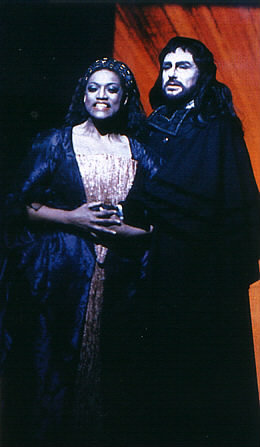
Moser with Jessye Norman in Ariadne auf Naxos
Though he appears on several recordings and has had a major operatic
and concert career, the American tenor Thomas Moser is not particularly
well-known in his native land. Born in Virginia and trained at Curtis,
he also studied in California with Martial Singher, Gerard Souzay and Lotte
Lehmann. Moser has spent most of his career in Europe. As he
says, his American appearances are few and far between. One of those
rare American performances was with the Chicago Symphony in May of 1998 as
Florestan in Beethoven's Fidelio at Orchestra Hall conducted by Daniel
Barenboim. During his brief stay in the Windy City, we met in one of
the offices at the newly-completed Symphony Center and had a chat about musical
things. He alluded to the fact that some operatic centers have a circus-like
atmosphere, and that is where we pick up the conversation.....
Bruce Duffie: Well, let's start right there. How much of opera is a circus?
Thomas Moser: Certainly there is a relationship, especially if you go to performances in Italy. You'll see a lot of the circus atmosphere of opera - the throwing fresh meat to the lions. If those high notes don't make it, thumbs down and if they do, thumbs up. (Both laugh)
BD: Should it really be a contest every night for the performers?
TM: I don't think that all of us look at it as a contest. There's an element of the audience that does, but I don't think that all singers do. There are probably some, but especially when you are in the kind of repertoire that I do most of the time, the contest isn't quite so evident.
BD: I was going to say, Richard Strauss was not very helpful to the tenor voice.
TM: Well....let's say that he wrote in a difficult fashion. When it's done well, it's beautiful. The roles are often thankless because when they're done well, nobody notices. When you're bad, everyone notices. But the Emperor in Die Frau Ohne Schatten has some of the most beautiful music of the evening to sing. But there's just 3 little episodes in about 4 and a half hours of music.
BD: Do you feel like you are 3rd or 4th billing then?
TM: No, I never feel that way, regardless of the role. Sometimes there are people that try to make you feel that way, but I never feel that way about the role. I'm there to do what I do. I'm the tenor of the evening and I have three beautiful episodes to sing and I enjoy it a lot. I also enjoy singing Bacchus in Ariadne auf Naxos, difficult as it is. I enjoy making the attempt to try to turn it into music.

Moser with Jessye Norman in Ariadne auf Naxos
BD: Do you succeed?
TM: Most of the time.
BD: It seems interesting, though, that you would balance your repertoire with a lot of Mozart and a lot of Strauss and leave a kind of big gaping hole in the middle. There's no Verdi, and there's no Puccini...
TM: Well, there's no Verdi and there's no Puccini because nobody ever asked me to sing Verdi or Puccini.
BD: So if someone comes to you for Alfredo or Don Carlo...
TM: Well, it's probably too late for Alfredo. Don Carlo might still be very interesting. I find Don Carlo interesting as a figure. It's not my favorite opera by any means.
BD: What about Alvaro. That's a more heavy part.
TM: I have to say that it's a part I don't know very well.
BD: This leads into a good question. How do you decide which roles you will accept and which roles you will decline when you are offered them?
TM: Well, the first thing I do is to take a look at the score and see what the basic range of the role is, to try to understand the situation. For instance, when I was beginning, I was perfectly capable of singing Almaviva in Barber of Seville, but nobody in their right minds would hire a 6 foot, 5 inch, hefty Almaviva that's probably larger than the Figaro. In the beginning of my career I was singing almost exclusively Mozart. One Rossini role I did sing was in Mose in Egitto, but that is a completely different sort of animal, a different kind of Rossini than Barber of Seville. I don't know if I could have sung Cenerentola, but certainly Almaviva I could have sung. But I wasn't right for that on the stage.
BD: Would you have perhaps done some of these roles for a radio broadcast or recording?
TM: Sure. I would love to sing operetta, but nobody gives me the chance. I'd love to sing Lehar and all of those things for the pleasure of singing them.
BD: So do you put "Dein ist mein ganzes herz" on your recital programs?
TM: Only as an encore, depending on where I sing.
BD: Does it ever surprise you when management will offer you a role? Do you ever ask yourself, "What are they thinking?"
TM: Yes. Sometimes. My first Lohengrin was not until 1994. When I began in Vienna in 1977, the Strauss roles that I was singing were the lyrical ones–Henry in Schweigsame Frau; Narraboth in Salome, and Flammand in Capriccio. During a Capriccio rehearsal, we went on break. The soprano was an American who was one of the people responsible for my going to Europe in the first place, and the conductor was Horst Stein, who just celebrated his 70th birthday this month. Horst turned to my colleague and said, "In 15 years, that's my Lohengrin." I just laughed, because I never imagined that, except for the Seeman in Tristan and Isolde and the Young Sailor in Fliegende Hollander, there was anything for me to sing in Wagner. Then, in 1994, there I was on the stage in Geneva singing Lohengrin for the first time.
BD: Did it make a difference that it was in Geneva which has a rather smallish stage?
TM: I don't like to use the word ‘experiment,' but until I've sung a role in front of an audience in real performance condition, I don't consider that I've proved to myself, finally, that it's for me. One has to make the acid test. Singing with the piano is one thing. Even singing with the orchestra is another. But singing with the orchestra on the stage with action, with all of the pressure of performance is still another.
BD: I see. One time through with all of the stops pulled out.
TM: Yeah.
BD: Are you one of those who sings on the interest and not on the capital?
TM: I certainly attempt to.
* * * * *
BD: You seem to have paced your career very well.
TM: The pacing was not always of my doing. The pacing was sometimes taken by fate.
BD: Are you not in control of saying yes or no?
TM: Control of saying yes or no, that's absolutely true. The point is that, for the most part, tempting offers of things that I shouldn't have sung at a particular time weren't there. I have plenty of colleagues, or sufficient colleagues, who have ruined their voices in the course of a career because they said "yes" too soon to roles that perhaps they would have eventually sung, but they shouldn't have begun when they did. The fact is that nobody offered me those roles at a similar period.
BD: But you obviously knew what you were doing ahead of time when you laughed at the thought that Lohengrin was going to come into your repertoire.
TM: Well, let's put it this way. I've never had a goal. I've never had the desire, the need, to say, "I MUST sing Tannhäuser, or I MUST sing Otello." I want to sing what my voice can sing. I thought it was the only way to remain healthy and I'm much too catholic in my taste to want to be pinned down to any one thing. I couldn't say there was a special favorite.
BD: Are you the best judge of what you can and can't do, or should there be another set of ears out there?
TM: There should always be another set of ears. I would venture the guess that most singers are not the best judge of what they can best do. Or let's say, not all the time.
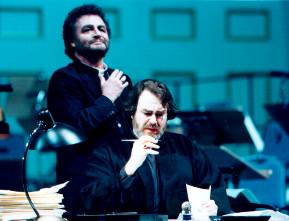
Moser (seated) with Franz Grundheber in Palestrina
BD: OK, so you sing these roles because they're dictated by your voice. Do you like those characters?
TM: Yes.
BD: You wouldn't rather be the devil or Wotan or something?
TM: Oh, I'd love to be the devil. Maybe I'd like to be Wotan, but I haven't gotten that far and I don't see myself ever singing The Ring - except that perhaps if it would occur to someone to ask me do it, I might like to trifle with Siegmund, maybe. But Siegfried doesn't interest me in the least.
BD: Not Loge?
TM: Yes. But in a couple of years. When I'm no longer wanting to sing the Lohengrins and the Florestans and things like that, then I would like to take a look at Loge. The reason being that although, in my opinion, Loge demands a first-class voice, the casting of Loge is generally done, these days, with a character voice. I don't consider myself to be a character tenor at the moment. When the heroic parts have to be put aside, then I'll be happy to go to Herod and Loge and some of the other things that I think I would have something to offer. But I'm not ready to do that yet.
BD: I would think that you would bring a great stage presence to it as well as the ringing voice.
TM: Well, I'd like to think so.
BD: You say you don't have any goals of what you must sing. Are you going to know when it's time to retire some of these roles?
TM: Well, I've already retired a number of roles. I retired almost all of the Mozart roles. At the time I retired them, I regretted having retired them. Five years later, it didn't make any difference. Two seasons ago, I retired Faust in Damnation of Berlioz from my repertoire, because I felt that with all the other things I was singing, it was becoming too much of a cramp to find the balance to do that role on the stage anymore. Whether I would sing it in a concert if I were asked is something I would have to consider at the time. But I will never sing it on the stage again simply because I wanted to leave it before somebody asked me to.
BD: Do you adjust your technique at all for the size of the house - if you're in a great big house or a very small house?
TM: No. I think the technique ever changes. I can't exactly explain what does change. What changes is the dimension with the role. I don't sing Tamino any differently than I sing Lohengrin, but I wouldn't like to sing Tamino AFTER Lohengrin without about 2 weeks interval.
BD: But you could do it the other way around.
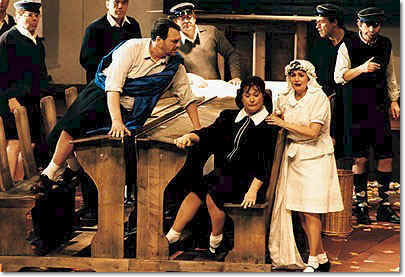
Moser (on desk) with Eva Marton and Inga Nielsen in
Lohengrin
TM: Yes. That's no problem. Singing Tamino is like warming up for Lohengrin. But Lohengrin is a different. The Wagner roles have a different scope. If I've sung Wagner or Strauss, I'd have to go back to something like Mozart or Beethoven, or recital repertoire. I need time to shut the machinery down, regenerate the batteries and start on – I don't even want to say a lighter technique because, in my opinion, the technique hasn't changed – but the dimension has changed.
BD: How do you balance your career, then, between opera and concert?
TM: In a very lop-sided fashion. In the beginning of my career, it was a lot of concert and less opera. Now it's almost all opera and practically no concert, and that doesn't please me at all because I love to do the concerts and I love to sing recitals. I'm trying to balance it a little bit. But, as the old saying goes, one has to make hay when the sun shines.
BD: You can't tell your agent to get you more concerts?
TM: Well, it's not just the agents. When the opera houses are interested, I have to be interested too. One of the big problems is that since approximately 1989 or 1990, I find myself working my way into new areas of repertoire, and that means doing new productions. I've spent the last seven or eight years doing nothing but new productions. So, I'm usually in one place for a longer period of time.
BD: Does that give you any rest at all?
TM: No. Of course not. It just means complete concentration on one thing, with not much possibility to get away and do other things because rehearsal periods are becoming longer and longer.
BD: But you can "mark" during the rehearsals. You don't have to sing full out.
TM: Of course, of course. But it's not even always the physical fatigue as much as the mental fatigue. When your defenses are down because your concentration is gone, maybe you forget to sing just the way it ought to be done. Maybe you're not quite there.
BD: So you have to really think about the technique and not just rely on automatic pilot.
TM: Well, I think you rely on automatic pilot. It's interesting. I've just been reading Astrid Varnay's book which came out last year. I just read yesterday a chapter in which she said, "Yes, you're on automatic pilot except, of course, for all of those difficult moments when indeed, you have to think about how you are going to sing it." For instance, I always compare singing - successful singing - to a person who's a result of successful psychotherapy. You don't get rid of your neuroses. You learn to negotiate around them and deal with them but you never really get rid of all of your fears. Some of them, you probably do and others are with you every night. I had a wonderful piano teacher at the Curtis Institute who was also the accompanist for my voice lessons, and when someone would get to that clinch moment, she would always whisper, "Think the correction, not the mistake." So I always say that when those moments come on the stage. In those moments, I'm sort of standing beside myself saying, "Now's the voice lesson. Remember how you do it."
BD: And that doesn't break your concentration of the character or anything?
TM: No, no. You're already thinking of text, thinking of notes, thinking of dynamic levels, thinking of stage action, thinking of the intention that you're trying to put over with the text. Why not have to think about a voice lesson too? If you divide yourself 5 or 6 ways, why not 7 or 8?
BD: And the guy waving the stick at you is not too distracting?
TM: Hopefully, he's helping. (Both laugh)
BD: Without mentioning names, do most of them help?
TM: Yes. I think so. At least most of the ones with whom I have the pleasure to work. For instance, one of the pleasures of working with Barenboim is that he conducts the way he plays the piano, which is that he makes music. That doesn't mean that every bar is in the same tempo as the one before or the one that comes afterward, or that every night the tempi are exactly the same. He fires me on from the orchestra pit and at the same time, I know that I give him, with my interpretation, ideas that make him react in a certain way. It's that playing back and forth that's one of the great pleasures of being on the stage with a great conductor in the pit. Levine is certainly one of the finest operatic conductors of our time. He really is ready to help at every moment. He breathes. That's a very important thing, to breathe with a singer. Jimmy certainly does that. Colin Davis is one of those people who always made me feel as if he were carrying me on a silver platter. He made me feel bigger and greater than I thought I could ever be.
BD: These are the guys who really love the human voice.
TM: Absolutely. Bernstein was another. I had the great privilege and pleasure to work with Lenny 2 or 3 times toward the end of his life and it was a marvelous experience because you felt how much he loved the human voice.
* * * * *
BD: You're an American, but you've made a major part of your career in Europe.
TM: Well, all of it. My excursions back to the USA have been very few and far between.
BD: Is this a good thing, a bad thing, or just a thing?
TM: Just a thing. I can't make any value judgment. I would venture to say, without wishing to be injurious in any way, that because there is so much more music happening in Europe than is happening in the vast United States, let's say at a certain level–at the level that really interests me–that probably simply more is happening there in which I can be involved than is happening in the United States. But that's not any kind of qualitative judgment, it's quantitative.
BD: Are you "fest" some place?
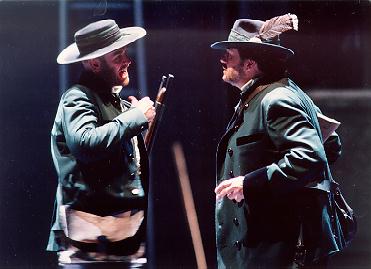
Moser (right) with Monte Pederson in Der Freischütz
TM: No. I was "fest" for 13 years in Vienna, but as of 1991, I made myself free. I had all the freedom imaginable in Vienna until 1991. When it came to negotiations for a new contract, they wanted to nail me down so much that I couldn't possibly have gotten out. Since it was my opinion that all of my growth had been because of my international career, I was unwilling to have that come to an end. I still live there, but I'm a guest in the house.
BD: Do you like wandering the world with your voice?
TM: Yes. I have to say I do. Sometimes, because the grass is ALWAYS greener, I envy those people who sit in one place and prune their roses and know that they can always have dinner at 7 with their friends or go out to the movies on the weekend, but those days will come.
BD: I asked about change of technique for size of house. Do you change your technique at all for the microphone?
TM: No. Except that for the microphone, I try to stay as light as possible because I know that the microphone is not very friendly to a voice that isn't sung in a slim fashion. The microphone loves a small, clear, slim tone and dislikes a big, broad tone that's too full of color.
BD: But that big, broad tone is what you need in the opera house and the concert hall!
TM: Well, I think that singing in a broad fashion is very dangerous. It may sound broad, but it's not. For instance, with Florestan or Lohengin, if you sing broadly in the middle, you're not going to make it to the top. You always have to be thinking of that lovely, slim, forward tone and the rest of it is your own personal resonance and what your vibration does to the room, or what the room does with your vibration. But you can't make an adjustment in technique to change from one room to another or from one acoustic to the other because that just isn't possible. It's the fallacy of people who believe that they can hear themselves sing. You're to feel yourself sing, because the thing that never changes - or never should change - is the FEELING of singing correctly. What you hear changes from room to room and so, for instance, if all of a sudden you're in a place as dead as a doornail, when you're listening to yourself you have the impression the sound of your voice stops at your lips. Then suddenly you find yourself pushing.
BD: And then that spreads the tone...
TM: ...and makes you hoarse and eventually you're going to lose your voice.
BD: So you have to be self-reliant completely.
TM: Yeah. You have to trust your feelings. You have to know what it feels like to sing correctly and reproduce those feelings. There are those moments when it's very difficult because you hear that there's no reverberation in the hall.
BD: But don't you hear that, also, in the same way from your colleagues?
TM: No. Oddly enough, no. It's a completely personal thing. Very often you'll find colleagues putting their hand up to an ear to get an idea of what they sound like but that's a completely false impression. You sound great to yourself, but not necessarily outside yourself. It's just the theory of projecting the voice. You can't project the voice. You have to make your body ring, and that ringing body will vibrate in the room and everything that is vibratable, will vibrate in sympathy with you. But if you try to throw your voice out into the room, you're going to have a straighter, non-vibrating tone with a lot of force behind it which ends up sounding very small in the back row.
BD: Can you do anything with the focus?
TM: The focus, for me, is in the vowels. They have to be forward. They have to be right there on the front teeth, on the lips. That's the focus for me. But I don't think about anything called "focus." Focus is not a word I use in my singing vocabulary. I was taught to believe or to convince myself that even though we all know that singing the way an opera singer sings is an unnatural act, to make it seem and feel as natural as possible. I've talked myself into the idea that what I'm doing, when I sing correctly, is allow my voice to be the way it wants to be, the way it prefers to be. I'm sort of getting myself out of the way and letting my voice take over, or do its thing, or flow, or however you want to put it.
BD: Do you ever feel you're a slave to the voice?
TM: Only on those days when things won't go quite the way I want them to or I'm feeling a little bit depressed about myself. Then I think, "if only I had learned something else, I wouldn't have to use my voice. I could go do something else."
BD: Like sell real estate or something?
TM: Well, I don't want to do that, but once in a while you think it would be nice to go teach literature at Columbia University or whatever, but unfortunately I didn't get my degrees in literature, so I can't do that.
BD: Do you do any teaching of voice?
TM: Yes, I do.
BD: What advice do you have for the younger singers coming along?
TM: As far as teaching is concerned, I try to give to them what was given to me. I don't know what to say as far as general advice for people who think they want to sing. If you can live without it, don't do it.
BD: It must be all-consuming.
TM: Absolutely.
BD: Are you impressed with what you hear coming out of the younger throats these days?
TM: Yes. Not always, but I wasn't always impressed with what I heard coming out of older throats. My teacher, who lived to be over 80 and who certainly, in his day, heard and worked with all of great stars, said in the 1970s that singers today sing lower, higher, louder, softer, faster, slower. He once was judging Met regional auditions in Los Angeles and turned to me and said, "I've just eliminated 10 people who, in my day, at the Paris Opera (that means from 1930 until 1943) would have had the vocal material to be stars, but they weren't good enough to go the finals of the Met Regional auditions in Los Angeles in 1974.
BD: So we've raised the bar that much.
TM: He was of that opinion. There are a lot of people who'll tell you exactly the opposite. But he wasn't an aficionado. He was a singer.
* * * * *
BD: Is the music you sing for everyone?
TM: I doubt it.
BD: Should it be?
TM: No. Is rock and roll for everyone? I doubt it. Should it be? I also doubt it. I like all music when it's well done and when, in my opinion, it's in its place. I like modern music, contemporary music. I would love it if there were more things composed today. I would have no aversion to singing them, to learning them, to taking the trouble to learn them, if I were given the time and paid to take the time to do the work, because it does take more work.
BD: Well, are you optimistic about the future of music?
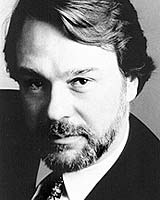 TM: I'm generally an optimistic person. I have trouble remaining
optimistic about the future of opera because I see the red pencil everywhere.
At the moment everybody believes that in the United States things are going
great. How long the United States can bounce along on the present condition,
is not clear to me because it's not really clear to me how long one country,
even if it considers itself to be the richest and most powerful in the world,
can bounce along on a lovely economy when the rest of the world seems to be
in a period of great suffering financially. Eventually, the bottom has to
fall out, at least a little bit. Things have to, just as water seeks its own
level. All of these financial things also eventually seek their own level.
TM: I'm generally an optimistic person. I have trouble remaining
optimistic about the future of opera because I see the red pencil everywhere.
At the moment everybody believes that in the United States things are going
great. How long the United States can bounce along on the present condition,
is not clear to me because it's not really clear to me how long one country,
even if it considers itself to be the richest and most powerful in the world,
can bounce along on a lovely economy when the rest of the world seems to be
in a period of great suffering financially. Eventually, the bottom has to
fall out, at least a little bit. Things have to, just as water seeks its own
level. All of these financial things also eventually seek their own level.
BD: Do you think there'll be a big realignment?
TM: I think so.
BD: Will opera be left out?
TM: Well, it's just the fact that culture is where the red pencil gets used first. In one sense, you have the advantage in the United States that culture is only marginally subsidized by the government. The contrast is in Europe where the entire subsidy comes from the government. Nonetheless, as things become more and more difficult to finance, fewer and fewer wealthy individuals will be found to finance them. Consider the difference in the population of the United States and Germany. Every larger city in Germany has an opera house. Many of them have been abandoned or the smaller theatres within a region have gone together and they still play their opera houses, but it's one company that plays 2 or 3 locations. But certainly all of the middle sized houses still exist and the larger houses all still exist. But times are getting harder and harder. Everyone is tightening their belt and it means a lot of sacrifice.
BD: One last question. Is singing fun?
TM: Oh yes. Well, it's fun because it's my language. It's
my means of communication. That's why I have to do it. It makes me complete.
If I could be a complete individual without singing, I wouldn't have had
to do it.
* * *
* * *
* * *
= = = = = = = = =
= = = =
* * *
* * *
* * *
Just to set the record straight, the tenor Thomas Moser is not related to the soprano Edda Moser. They have sung together on occasion, including his first big concert conducted by Carlo Maria Giulini, but that's the extent of their relationship - purely professional.
Bruce Duffie is back to work at WNIB after undergoing a serious abdominal operation in May. 24 years ago, he underwent major surgery and was away from the station for 11 weeks. This time, he was away for 4 weeks. He fully expects that 24 years from now, he'll again be sliced and diced, and be back at work in a matter of hours!
WNIB, Classical 97 in Chicago is now on the internet - get the information and downloads you need at http://www.wnib.com ... and check out Bruce's personal website [http://www.bruceduffie.com], and send him e-mail [duffie@voyager.net] .
Next time in these pages, a chat with Pulitzer-Prize winning composer Robert Ward.
=========
© 1998 Bruce Duffie
Published in The Opera Journal, September, 2000
- - - - - - -
= = = = = = = = = = = = =
- - - - - - -